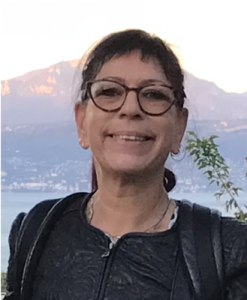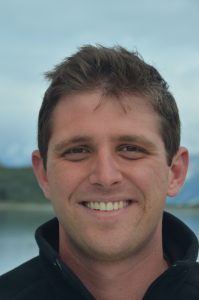The SONIC Speaker Series presents
Céline Rozenblat
University of Lausanne (UNIL), Switzerland
A Multi-Level Network Perspective on Complex Urban Systems
SONIC Lab is proud to welcome Dr. Céline Rozenblat of the University of Lausanne. She will speak on Tuesday, May 21st at 10 am in Frances Searle Building, Room 1-483. Please contact Brent Hoagland with any questions.
 Abstract: In the context of knowledge and information societies, new tendencies in the long/medium term evolution of urban systems, together with new data and methods, require that existing theoretical assumptions and conceptualizations be challenged as global urban hierarchies are reconfigured. The connection between urban systems at different levels of organization becomes more and more relevant for understanding urban systems and their transformations. But the current inter-urban perspective is not sufficient to encompass these dynamics. Other cognitive, social, and institutional proximities in the innovation processes combine with spatial proximities. It leads us to consider cities in several dimensions of proximities in a multilayer perspective. The evolution of power distributions inside and between cities reshapes the world organization of central/peripheral cities and the complexity of the global urban system. Actors as multinational firms, or high-level innovation centers, participate actively in these reconfigurations that concentrate wealth, control, innovation, and attractiveness in a few cities. In the complexity of this multi-level system, how is regionalization of the world reshaping in a multipolar urban world? How does the multi-level perspective highlight some resilience properties? The methodologies derived from complex systems sciences bring new forms of intelligibility to worldwide urban dynamics.
Abstract: In the context of knowledge and information societies, new tendencies in the long/medium term evolution of urban systems, together with new data and methods, require that existing theoretical assumptions and conceptualizations be challenged as global urban hierarchies are reconfigured. The connection between urban systems at different levels of organization becomes more and more relevant for understanding urban systems and their transformations. But the current inter-urban perspective is not sufficient to encompass these dynamics. Other cognitive, social, and institutional proximities in the innovation processes combine with spatial proximities. It leads us to consider cities in several dimensions of proximities in a multilayer perspective. The evolution of power distributions inside and between cities reshapes the world organization of central/peripheral cities and the complexity of the global urban system. Actors as multinational firms, or high-level innovation centers, participate actively in these reconfigurations that concentrate wealth, control, innovation, and attractiveness in a few cities. In the complexity of this multi-level system, how is regionalization of the world reshaping in a multipolar urban world? How does the multi-level perspective highlight some resilience properties? The methodologies derived from complex systems sciences bring new forms of intelligibility to worldwide urban dynamics.
Céline Rozenblat, is professor of Urban Geography at the University of Lausanne, Switzerland and president of the urban commission of the International Geographical Union (IGU). She studies systems of cities at European and world scales, multinational firm networks, inter-urban dynamics, comparative urban data, mapping and visualization of networks in geography, and spatial analysis. For several years she has worked on the relations between the evolution of multi-level urban processes and dynamics in city-system networks. To study these topics comparatively, she has built many databases on large European and worldwide cities and the networks they form. In particular, she has dealt since 1990 with databases on multinational firm networks and on city properties and evolution in a multi-dimensional and long temporal approach. Diachronic and dynamic studies supply materials to develop spatial and dynamic models and visualizations. She participated in European projects like ESPON FOCI 2008-2011, FP7 FET Insite (2011-2013) and Multiplex (2012-2016). She also participates to the EuropeAid project with China MEDIUM (2015-2019) on medium size cities in China and launched two projects LOGIICCS (FNS 2015-2018) and MEDIUM (SWISS-Conf. 2016-2018) on modeling Indian and Chinese cities’ integration in global networks of multinational firms and innovation.


The Economist Babbage Podcast – “Joker AAAStrounauts.”

 Abstract: In the context of knowledge and information societies, new tendencies in the long/medium term evolution of urban systems, together with new data and methods, require that existing theoretical assumptions and conceptualizations be challenged as global urban hierarchies are reconfigured. The connection between urban systems at different levels of organization becomes more and more relevant for understanding urban systems and their transformations. But the current inter-urban perspective is not sufficient to encompass these dynamics. Other cognitive, social, and institutional proximities in the innovation processes combine with spatial proximities. It leads us to consider cities in several dimensions of proximities in a multilayer perspective. The evolution of power distributions inside and between cities reshapes the world organization of central/peripheral cities and the complexity of the global urban system. Actors as multinational firms, or high-level innovation centers, participate actively in these reconfigurations that concentrate wealth, control, innovation, and attractiveness in a few cities. In the complexity of this multi-level system, how is regionalization of the world reshaping in a multipolar urban world? How does the multi-level perspective highlight some resilience properties? The methodologies derived from complex systems sciences bring new forms of intelligibility to worldwide urban dynamics.
Abstract: In the context of knowledge and information societies, new tendencies in the long/medium term evolution of urban systems, together with new data and methods, require that existing theoretical assumptions and conceptualizations be challenged as global urban hierarchies are reconfigured. The connection between urban systems at different levels of organization becomes more and more relevant for understanding urban systems and their transformations. But the current inter-urban perspective is not sufficient to encompass these dynamics. Other cognitive, social, and institutional proximities in the innovation processes combine with spatial proximities. It leads us to consider cities in several dimensions of proximities in a multilayer perspective. The evolution of power distributions inside and between cities reshapes the world organization of central/peripheral cities and the complexity of the global urban system. Actors as multinational firms, or high-level innovation centers, participate actively in these reconfigurations that concentrate wealth, control, innovation, and attractiveness in a few cities. In the complexity of this multi-level system, how is regionalization of the world reshaping in a multipolar urban world? How does the multi-level perspective highlight some resilience properties? The methodologies derived from complex systems sciences bring new forms of intelligibility to worldwide urban dynamics. Abstract:
Abstract: